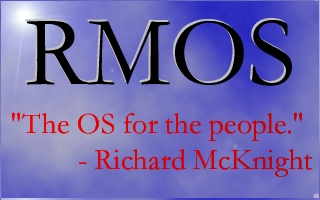This page hosts two of my endeavors at creating quasi-operating systems:
McUnix (mcunix.exe)
This is the first OS oriented program I wrote. It is designed to clone the Linux Bash command prompt and functionality. It supports full tab-completion for both file and directory structures, a scrollable history log, and semi-online help. Unfortunately, it does not support long file names or command line editing. These two oversites will be remedied in the RMOS (see below) release of McUnix, tentatively scheduled for April.
RMOS (rmos.exe)
This is due to my now greater knowledge of C++ and virtual machines. I have decided to change the name of the project to SQOS (read: Scripted Quasi-Operating System) to reflect the extensive alterations. For starters, the programs for the SQOS must be written in my own language (name undecided at the moment) which mimicks C very closely. The reason for this, is to promote the concept of free source which will allow others to read your code so that they may learn and modify it. SQOS will convert the programs into bytecode just before their execution which gives SQOS the ability to process the code as efficiently as possible. I understand that compiling the code and having SQOS run the bytecode directly is a little faster, but I think that the current method will enforce open source and give SQOS more freedom over the instructions being executed. That's all the news I have for now, but I'll post updates when somethings major happens.
**More information regarding RMOS will be released as it developes and the BETA version executables will be put online for download as soon as they are stable.**

7 March 2000 - I have created a new logo for my OS!!!
"The RMOS project is my attempt at writing a multi-threading GUI interface for DOS-capable machine. It is aimed at being able to run on (cheap!) low end machines which have difficulty running other OSes. RMOS will also provide native support for handling graphics, audio, and I/O calls. Thus, programmers can write games and applications under RMOS without having to write those boring routines. The programs just have to be linked with RMOS' library and implement a few simple calls!
In the end, I would like to see this quais-OS have the ability to change to suit the needs of its users. It can be tweaked to perform as a "gaming OS" for people who want to breath life back into their older machines or it can become a "development OS" for those who want a productive environment under which to write their apps. The source will be released as soon as the code has become stable, so the hackers out there can alter the functionality of RMOS to their liking :)"
The above exerpt is taken from the README file for RMOS.